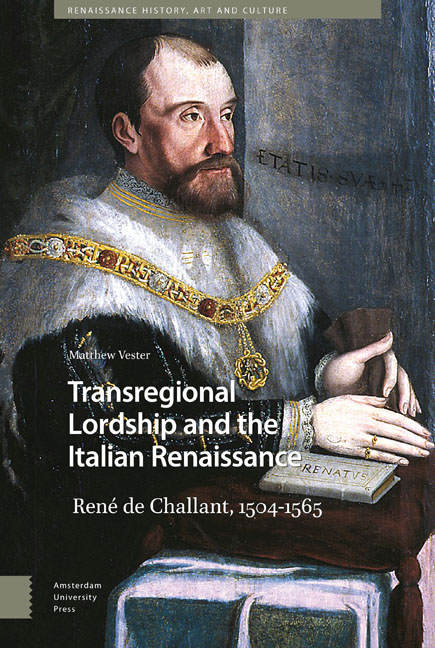Book contents
- Frontmatter
- Contents
- Maps and Tables
- Abbreviations
- Acknowledgments
- 1 On the edge of the Italian Renaissance
- 2 René's early career to 1536
- 3 René's growing influence during the war years, 1536-1553
- 4 René and Duke Emanuel Filibert
- 5 Kinship and noble life
- 6 The Challant political networks
- 7 Finance and brokerage
- 8 Lordship
- 9 The embodiment of spatial politics
- About the author
- Index
4 - René and Duke Emanuel Filibert
Published online by Cambridge University Press: 21 November 2020
- Frontmatter
- Contents
- Maps and Tables
- Abbreviations
- Acknowledgments
- 1 On the edge of the Italian Renaissance
- 2 René's early career to 1536
- 3 René's growing influence during the war years, 1536-1553
- 4 René and Duke Emanuel Filibert
- 5 Kinship and noble life
- 6 The Challant political networks
- 7 Finance and brokerage
- 8 Lordship
- 9 The embodiment of spatial politics
- About the author
- Index
Summary
Abstract
In 1553, Duke Emanuel Filibert succeeded his father and named René de Challant lieutenant general of his lands. Weeks later, René was captured by the French when they attacked Vercelli, and he spent the next two years trying to arrange for his release. In October 1555, he returned to Issogne and immediately took up diplomatic activity in the service of Emanuel Filibert and the Valle d’Aosta. He arranged for the marriage of his daughter Isabelle to the nephew of the Cardinal-Prince-Bishop of Trent and lost his second wife in 1558. In 1559, he oversaw the return of the western Sabaudian lands to their natural ruler. He married twice more prior to his death in 1565. Historians’ accounts of René's life are surveyed.
Key words: Emanuel Filibert, Vercelli, ransom, Madruzzo, Masino.
René and Emanuel Filibert
When Charles III died on 17 August 1553, René suddenly found himself the de facto head of Sabaudian government in the lands remaining under ducal control. For a few months, his constant movement across Europe came to a halt; from Vercelli, René ‘took up this office with great zeal’. That this transregional lord with sovereign claims of his own was willing to expend significant political capital in the service of a severely weakened northwestern Italian dynasty seems surprising. Episodes like this one raise questions about how loyalty, honor, self-interest, family identity, and passion intersected to inform this Renaissance noble's actions and caution us against simple assumptions.
As Charles’ body was lying in state, René sent to Emanuel Filibert to warn him about corruption in the Sabaudian government. The death of Charles III, they reported, had set off a raid on the ducal treasury by unscrupulous officials. René seized whatever he could find in Vercelli ‘in the hands of the officials repsonsible for these items, especially the rings’. There was no money for the deceased Duke's funeral. By handling this issue forcefully, Emanuel Filibert would show how committed he was to justice and the protection ‘of your poor subjects’, who would then be more likely to denounce corruption in the future. René pushed for a purge of the ducal bureaucracy, but this did not occur immediately.
- Type
- Chapter
- Information
- Transregional Lordship and the Italian RenaissanceRené de Challant, 1504–1565, pp. 109 - 138Publisher: Amsterdam University PressPrint publication year: 2020



